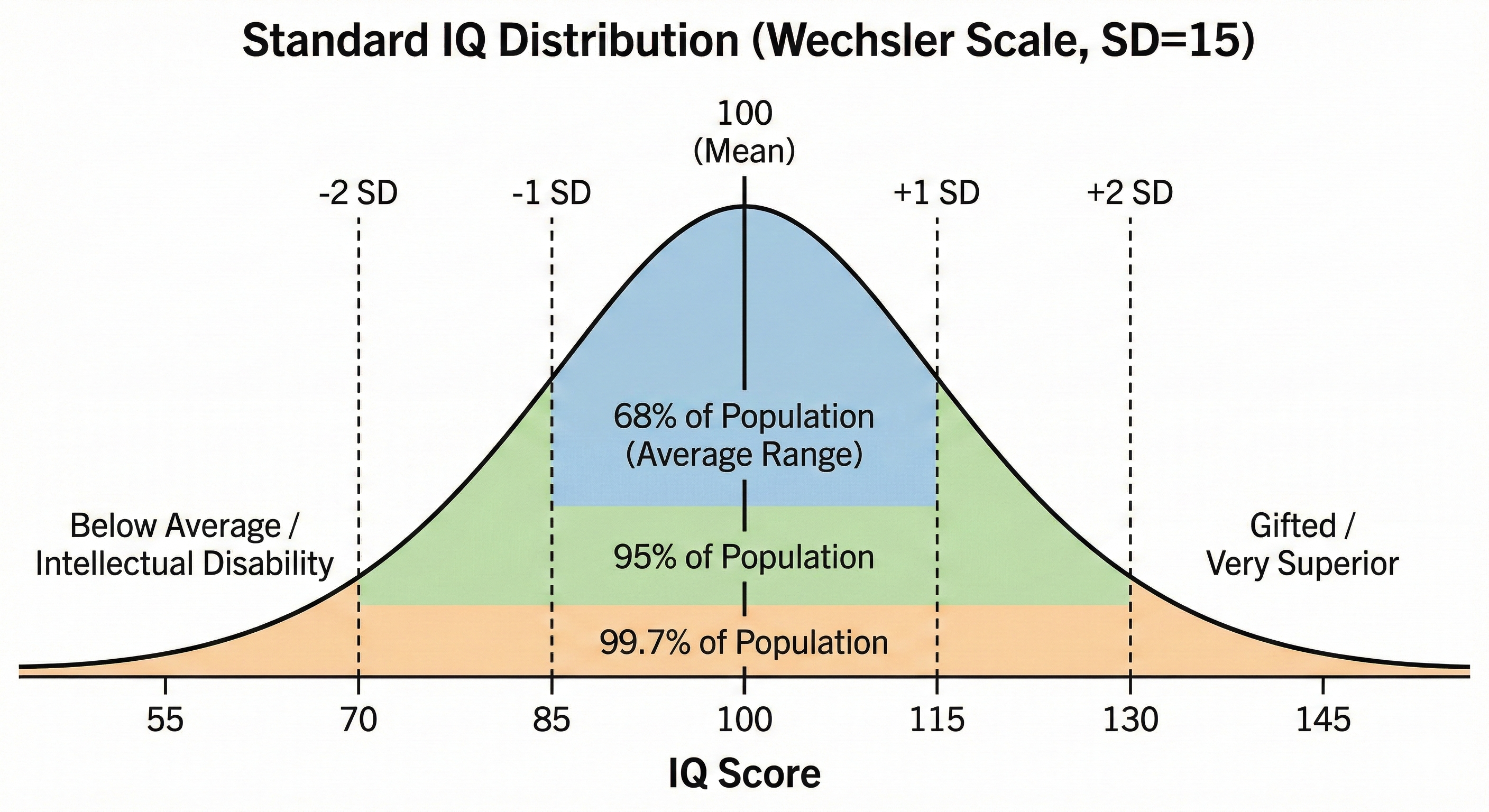The IQ Bell Curve Explained: Ranges, Percentiles, and What They Mean URL Slug
Introduction
When people talk about Intelligence Quotient (IQ), they often throw around numbers like 100, 130, or 160. But without context, these numbers are just arbitrary figures. To truly understand an IQ score, you have to understand the IQ Bell Curve.
The Bell Curve (or Normal Distribution) is the statistical foundation of almost all modern IQ tests. It explains why most people are “average,” why “geniuses” are rare, and how we compare cognitive ability across the population.
In this guide, we’ll visualize the curve and break down the specific score ranges used by psychometricians today.
Where does the IQ score come from?
One way to evaluate a person’s cognitive capacity is by calculating their intelligence quotient (IQ). It includes things like working memory, processing speed, verbal comprehension, and perceptual reasoning.
Common methods for assessing IQ often involve administering standardized tests that measure different cognitive abilities. The goal of these tests is to provide a numerical score that represents a student’s level of intelligence relative to their peers. The most widely used and comprehensive IQ test is the Wechsler Adult Intelligence Scale (WAIS).

Understanding Standard Deviation
To understand the “ranges,” you need to understand Standard Deviation (SD). In most modern tests, such as the Wechsler Adult Intelligence Scale (WAIS), the standard deviation is 15 points.
Think of the SD as a “step” away from the average.
68% of people fall within one step of the average (between 85 and 115).
95% of people fall within two steps (between 70 and 130).
99.7% of people fall within three steps (between 55 and 145).
If you score 130, you aren’t just “smart”—you are statistically two full deviations above the norm, placing you in the top 2% of the population.
IQ Score Ranges Breakdown
While different tests (like Stanford-Binet vs. Wechsler) use slightly different classifications, here is the generally accepted breakdown of IQ ranges.
85 – 115: The Average Range
Population Share: ~68%
Description: This is where the vast majority of humanity sits. People in this range can perform most jobs, complete high school and college, and function effectively in society.
85–99: Low Average
100–115: High Average
115 – 130: Above Average (Bright)
Population Share: ~14%
Description: Individuals in this range often grasp complex concepts faster than their peers. They tend to perform well in universities and professional fields such as engineering, law, and medicine.
130 – 144: Moderately Gifted
Population Share: ~2%
Description: This is the cutoff for high-IQ societies like Mensa. People in this range often exhibit early reading abilities and strong pattern recognition. They represent 1 in 50 people.
145 – 159: Highly Gifted
Population Share: ~0.1%
Description: This is a rare level of cognitive ability (roughly 1 in 1,000 people). Individuals here often have radically different learning needs and may accelerate through standard education systems rapidly.
160+: Profoundly Gifted
Population Share: <0.003%
Description: This is the “tail” of the curve. These scores are difficult to measure accurately because the sample size of people at this level is so small. This range is often associated with child prodigies and revolutionary thinkers, though high IQ does not guarantee high achievement.
Below 70: Intellectual Disability
Population Share: ~2.2%
Description: Scores below 70 may indicate cognitive challenges. This range often requires support systems for daily living or specialized education plans.
Does High IQ Equal Success?
It is important to remember that the Bell Curve measures cognitive processing speed and pattern recognition—not worth, creativity, or potential for happiness.
While a high score correlates with academic success and income, it does not measure:
Emotional Intelligence (EQ)
Grit and determination
Creativity and divergent thinking
A person with an IQ of 105 who works incredibly hard will often outperform a person with an IQ of 135 who lacks discipline.
Key Takeaways
The average IQ is 100.
Most people (68%) score between 85 and 115.
A score of 130+ puts you in the top 2% of the population.
IQ is a comparative metric, not an absolute measure of human value.
Ready to test your own cognitive skills? Take your IQ Test here



